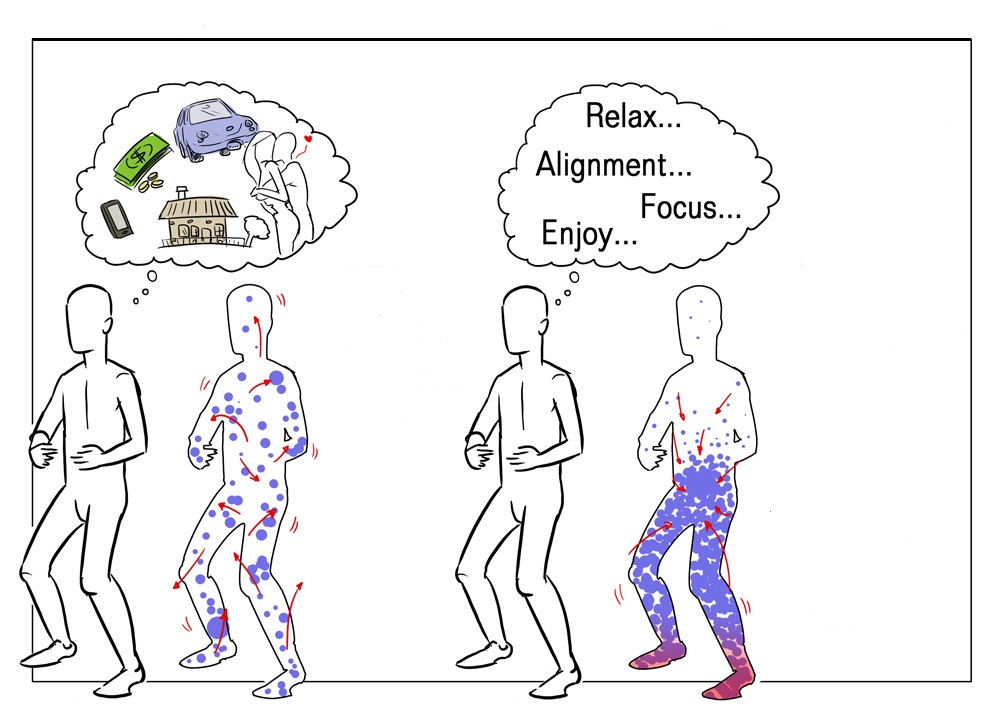Lesson 3: Mind Stability (Theory)
|
Teacher, I've learnt about the Stable Line of Gravity (中線). I understand that to enter the Tai Chi State, I have to be Relaxed. But no matter how hard I try, I just can't seem to Relax. Why is that? |
There are two aspects for us to Relax. The body, and the mind.
- The Body: We have discussed in depth what it means to have a Stable Body Structure and a Stable Line of Gravity. This in turn allows us to relax our muscles. We are then able to place our body on the ground, as if we were an object.
With gravity, our body slowly stabilizes, and this is the practice to allow us to Relax in the Stationary State.
在身,是肢架穩定, 肌肉放鬆,肢體在地心吸力作用下, 穩定下來。這 功夫是靜態由入手 - The Mind: Our mind sends nerve signals to our muscles and directs them to contract when the mind feels that we are not stable (e.g. we might fall). We require our mind to Relax.
There is a connection between the mind and the body. As the mind will cause the body to become tense, we have to learn how to relax the mind-body connection.
在心,是思維上要入靜 (即是不用擔心身體平衡);心身是有關係的。 由於心會導致身緊張,因此我們需要建立一個放鬆的心身關係
|
Okay, I understand the need to Relax our body. Even though we may have the necessary physical conditions to Relax, we also need the equivalent mental conditions. So it's sort of like in body-building, where power-lifters find their "mind-muscle connection" in order to activate the specific targeted muscles. But wait ... how do I relax my mind?! |
Lets take a look at 'the Great Learning'(“大學”), one of the Four Books in Confucianism. The Great Learning applies to the Confucian philosophy, but we can also use part of the teachings there to understand the meaning of Stability ("入靜").
In order to understand Stability of the Mind, we apply one of the first phrase of 'the Great Learning(“大學”)' to Tai Chi.
|
“知止而後能定,定而後能静,静而後能安,安而後能慮,慮而後能得” |
The above passage has been translated as follows:
|
From: http://www.acmuller.net/con-dao/greatlearning.html
|
How does the above passage from the Great Learning help with Relaxing our Mind? I don't even understand the first phrase...
|
When we gradually learn to bring our mind-thoughts to a stop, our mind becomes stable.
|
For a more nuanced understanding, the Chinese term "止" can mean
We take the latter meaning - 止步 - i.e. Do not let our thoughts cross into the past or the future. Take it another way, it means we should be Present ("活在當下") |
By focusing our mind-thoughts, we work towards Mind Stability ("思維入靜")
Let us be clear about...
|
(1) What is Stopping?
In Tai Chi, we have to learn to direct our mind-thoughts to a stop.
|
Many people are unaware of the incessant voice in our head. Thinking becomes compulsive, and we can't stop. When we are stuck in "psychological time" (i.e. time as perceived in our minds), we become burdened by what we incessantly think about. What we constantly think about becomes our Fixation ("執著"). Our fixations are problems which we identify ourselves with. We identify with our feelings in the past, or we identify with the problems we project into the future. Our fixation results in various emotions, obscures us from the Present, the Now. We create "psychological time" in our mind.
When we identify with our thoughts and the various emotions that go with those thought, we create a false mind-made sense of self; we create our Ego ("我執"). 一般人對''我"的認識都不太關心,但行為上都以"我"為服務對象,佛家稱為我執。 |
From: Tolle, E. (2004). The power of now: A guide to spiritual enlightenment. Vancouver, B.C: Namaste Pub.
When we identify with our Ego, whenever we intend to do something, our muscles contract and tense up. The heavier our fixation, the more tense our muscles become. When we are in this state for a prolonged time, our body forgets what it means to Relax.
Mind stability is like water. The negative emotions create the ripples in the water.
1. When we identify with the various thoughts and emotions we have, we identify with our Ego. Our mind is unstable. The glass (our body) is affected by the shaking water (our thoughts).

From: https://fineartamerica.com/featured/glass-of-water-carl-moore.html
2. When we learn to not let our thoughts cross into the past or future (psychological time), we slowly stabilize our mind. There may be ripples, and that's okay.

From: https://www.quora.com/What-is-the-medium-for-the-propagation-of-gravity-waves
3. Because we no longer create more ripples, the ripples settle. Our mind is tranquil.

From: http://www.huhaokan.com/contact/2259173.html
|
4. Undisturbed by our mind, our body can become at a resting state. Once our mind is stable, with our Stable Body Structure, our body can Relax too. |

From: http://brisbanechentaichi.weebly.com/skill-knowledge.html
(2) How do we Stop?
|
I understand the importance of relaxing our mind. To do this, we have to be Present. But how do I be Present? |
To Relax our Mind, we lessen our attachment to our Ego. We separate our Ego from our body. See our next lesson on the Suspended Focus State.
習以為常,只要意動,全身肌肉都會緊張起來,執著較重的,肌肉會長期處於緊張狀態,亦較難體會身體放鬆的感覺。
Now we have perspective when we reread passage from the 'Great Learning':
“知止而後能定,定而後能静,静而後能安,安而後能慮,慮而後能得”
|
"When you learn to not let your thoughts cross into psychological time, you have mind stability. When you have mind stability, your mind can be tranquil. When your mind is tranquil, your body can be at ease (Relaxed). When you are at ease, you can deliberate. When you can deliberate you can attain your aims." |
Only when our mind is stable can our body be stable.